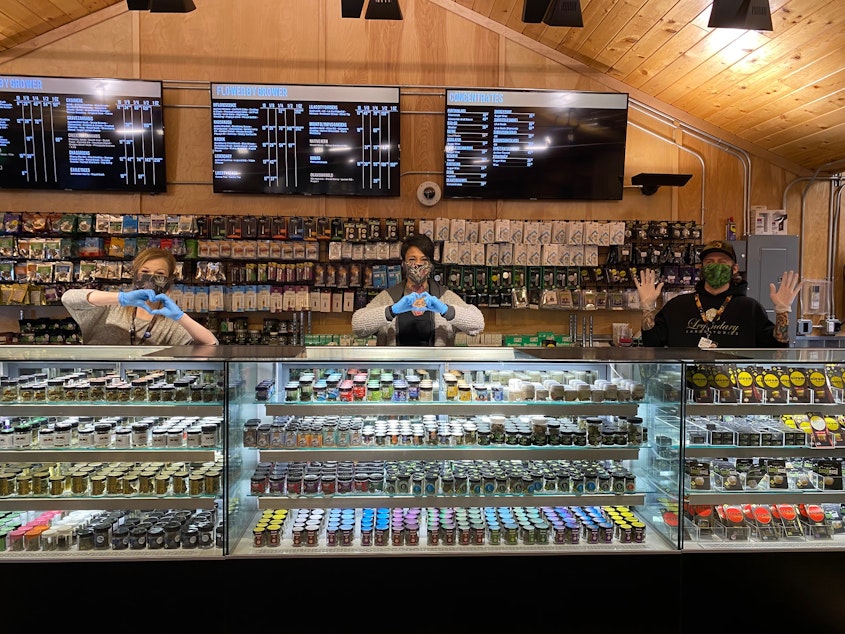Washington’s weed businesses are considered essential, but feeling squeezed

This year, the usually celebratory April 20 — also known as 4/20 — is a day of worry for Washington’s marijuana businesses.
Employees are wearing protective gear and wiping down surfaces every hour at the Canna West Seattle dispensary said CEO Maryam Mirnateghi.
“We’re going through about 5,000 gloves a week. It’s a crazy number of gloves.”
Although sales briefly spiked in mid-March, Mirnateghi said, they’re back to normal now. Expenses, however, have gone up for the dispensary as she scours the market for cleaning supplies and protective equipment. For example, one order of 20 masks generated a nearly $500 tab.
Moreover, Mirnateghi juggles staffing with half her employees at home with Covid-19 symptoms or in quarantine, and the other half working overtime.
April 20 is a symbolic day for marijuana consumers, but some weed businesses are feeling squeezed as the coronavirus pandemic causes expenses to rise. Pot stores are considered essential businesses in Washington state and have been allowed to remain open.
Sponsored
But people in the industry say it's not immune to the economic impact of the crisis.
“We’re feeling the pinch in the increased costs as well as an unpredictable sales market right now,” said Vicki Christophersen, Washington CannaBusiness Association executive director.
Anecdotally, members are reporting a recent drop in sales as physical distancing restricts customer foot traffic to a few people in a store at a time, she said.
Marijuana producers, processors, and labs also have to adjust staffing configurations to facilitate social distancing, Christophersen added.
Businesses are now required to pay new expanded sick leave benefits. But marijuana businesses are not eligible for the Paycheck Protection Program, a recently created federal loan program designed to help small businesses weather the effects of Covid-19.
Sponsored
Marijuana is still illegal under federal law, and the U.S. Small Business Administration says any business engaged directly or indirectly in the marijuana industry is ineligible for the agency's financial or technical assistance, according to spokesperson Cecelia Taylor.
“For example, the SBA would not consider a plumber who fixes a sink for a Direct Marijuana Business or a tech support company that repairs a laptop for such a business to be aiding in the use, growth, enhancement or other development of marijuana and thus both of these firms would be eligible for technical assistance under SBA programs,” Taylor said in an email.
Marijuana businesses already pay high state and federal taxes and are not allowed to deduct business expenses.
“Our businesses start out in an economic disadvantage,” Christophersen said.
The Washington CannaBusiness Association is advocating for federal and state help for the industry, and Christophersen said she is hopeful that future assistance packages will include help for marijuana businesses.
Sponsored
Small marijuana businesses were eligible to receive help through the “Keep Workers Healthy and Safe Fund” created by the Seattle Metropolitan Chamber of Commerce, spokesperson Alicia Teel said in an email.
One cannabis business was reimbursed for personal protective equipment through the program. However, that fund is no longer accepting applications.
At Canna West, Mirnateghi is trying to avoid any layoffs and stay open as long as possible, she said.
But, “without some sort of help, it’s uncertain what the future holds for us.”




